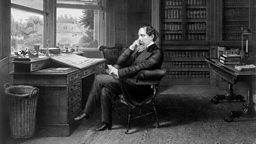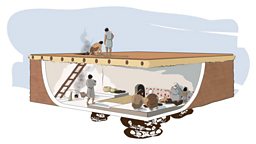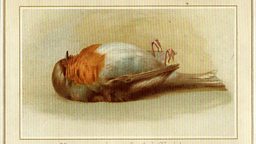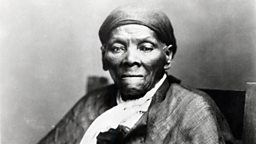Six surprising facts about the prison-escapist celebrity Jack Sheppard
Known for his wit and exciting criminal career, Jack Sheppard was one of the first media-created celebrities.
In this episode of the You're Dead To Me podcast, host Greg Jenner is joined by historian Dr Lena Liapi and comedian Stu Goldsmith to discuss the rise and fall of one of London’s greatest eighteenth-century sensations.
You're Dead To Me

Listen to the podcast on �鶹������ҳ��� Sounds
1. He was an apprenticed carpenter before he ‘jacked’ his job in
Jack’s mother’s employer removed Jack from the workhouse where he had lived for a year and a half, and helped him get an apprenticeship with a carpenter. The apprenticeship provided him with the skills he would later need to conduct his burglaries and famous escapes.

In the final year of his apprenticeship, Jack began to get involved in petty crime and he eventually abandoned his master for his newfound criminal friends.
2. The Black Lion tavern made him a bit TOO brave!
It is likely that he made friends like Elizabeth Lyon (Edgeware Bess) and Joseph “Blueskin” Blake at the Black Lion tavern on Lewkenor’s Lane. Such friends trained him to become a skilled thief.
However, taverns like the Black Lion were also his downfall. After his famed escapes, he usually returned to the same pubs and was therefore quickly apprehended - often in a drunken state.
3. Jack-of-all-trades, master of none
Despite his fame and abilities, he was an amateur criminal compared to his violent colleagues such as Blue Skin. He used his carpentry skills to break into houses and shops and he tended to steal small items such as handkerchiefs, gold rings and silver spoons. And whilst he was a talented thief, he did not master the art of avoiding capture because he was apprehended five times. Can’t have it all!
4. He escaped from prison four times - Jack Sparrow style
For his first escape, he broke a chair and used the pieces to create a hole in the ceiling of his cell. He used the hole to escape onto the roof before he disappeared into the crowd of people who had gathered to watch.
During his second imprisonment, visitors brought him tools over a number of days, which he used to remove his manacles and a bar from the window. Then he created a rope out of his blanket and Edgeware Bess’s clothes (who was allowed to be in the cell with him) and lowered both of them down 23 feet.
Visitors also brought him tools for his third escape, which he used to saw through the bars around his cell. Then he used a nightgown to hoist himself up through the hole. Dressed as a woman, he escaped unnoticed through the front door of the prison with Bess on his arm.
For his final escape, he used a nail and his knowledge of chains to free himself from his manacles. Then he climbed up through the chimney and unpicked the locks of the six doors which led to the roof. He briefly returned to his cell for the blankets he then used to lower himself onto a nearby house.

5. News of his daring escapes made him a superstar
Multiple newspapers reported on his escapes which helped build his reputation as a cheeky but playful anti-hero. Hundreds of people paid to visit him during his imprisonment in Newgate. He was featured in plays, ballads and on copper plates, and was even painted by the Serjeant Painter to the Crown, possibly at the suggestion of the king. King George also commissioned an art piece of Jack but it was never realised. It is believed that the famous phrase ‘Jack the Lad’ stems from the reputation of this confident young thief, and that the autobiography which was sold at his execution was probably ghostwritten by Daniel Defoe.
6. He was killed by his own fame
Jack met his end at the young age of 22 in 1724. His execution date was brought forward because his popularity had become a problem. Around 200,000 people (a third of London!) travelled to watch his hanging. He drank a pint during his long journey to the scaffold and advertised his new autobiography to the crowd. There were rumours that he intended to escape a fifth time. Indeed, a blade was removed from his jacket after the warden searched him and it was believed that his friends planned to rescue him at the last moment. However, the crowd was too dense to allow anyone to get to the front, and Jack died of asphyxiation. His body was seized by the crowd because they feared it would be used for surgical dissection. The army was eventually brought in to reclaim the body later that evening. Even in death, everyone wanted their hands on the famous young criminal.

More from You're Dead To Me
-
![]()
Mmmm... A history of chocolate in 10 quick facts
Find out why chocolate really is the "food of the gods".
-
![]()
Meet the richest person who ever lived: Mansa Musa
Forget Jeff Bezos - meet Mansa Musa, the richest person every to live.
-
![]()
Ten things you need to know about Blackbeard the pirate
Find out more about history's most notorious pirate
-
![]()
The hard-as-nails Spartan quiz
How much do you know about history's greatest warriors?






































